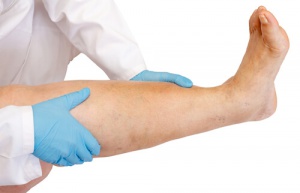Leg Swelling: Causes and Cures


Written and verified by psychologist Valeria Sabater
It’s normal for legs to get kind of swollen sometimes, especially among women: they often come with exhaustion, that tingly feeling you get when they fall asleep, or even pain.
However, worse than the sensations they cause, leg swelling can be an indication of a greater health problem. We should perhaps first clarify that when we say “leg swelling” we’re not necessarily just referring just to the swelling of the leg.
It’s common for just the ankles or feet to swell. Leg swelling itself isn’t a condition to be concerned about, but if it’s a symptom of another condition, it could be a problem. Let’s take a look at some information about this issue.
Also Read: Fight Exhaustion With This Carrot and Garlic Remedy
What can cause leg swelling?
The most common causes:
- Usage of improper footwear: shoes or boots that squeeze or pressure your feet can cause this. Alternatively, it may be that you’re wearing footwear for too long without taking them off.
- Working on your feet, or standing for many hours in the same position.
- Inactivity, lack of exercise.
- It’s normal for many women to retain liquids for days preceding menstruation. This condition is most visible in the feet and ankles.
- Consuming a lot of salt can also cause your body to retain liquids.
- Kidney problems.
- Intestines full of toxins.
- Varicose veins or edemas.
- Osteoarthritis.
- Weak veins that can prevent efficient circulation: this causes blood to accumulate.
- Being overweight or obese.
- Old age, especially when combined with an unhealthy diet or a sedentary lifestyle.
- Obstruction of the lymphatic ganglia.
- Contraceptive birth control, or other medications.
Also Read: Exercises for People Over 40
Remedies for swollen legs
First and foremost we must emphasize the importance of consulting your doctor in the case of possibly serious conditions. Their analysis should indicate that your swelling problem is not due to cardiac or kidney problems, conditions that will need other types of intervention than those listed here. However, once that has been cleared up, we can provide you with some small pieces of advice to help you alleviate that common and pesky discomfort.
What diet can I follow?
Your diet is the most fundamental factor in whether your system is cleansed or your body accumulates toxins. A symptom like swollen legs should be a signal that there’s something you are not doing properly and that your tissues are weakened and/or injured, and therefore you’re accumulating liquid. The toxins accumulate in the lining of your intestines, causing various stomach conditions and acidifying your blood. In order to avoid all this, you should consider eliminating the following items from your daily diet:
Forbidden foods
- Salty foods.
- Refined or fried foods
- Foods with many condiments
- Vinegar and mustard.
- Products with refined flour.
- Foods containing a lot of sugar
- Red meat.
- Cow’s milk and products derived from cow’s milk.
Cleansing diet
It may be necessary for you to change your diet. You may have to orient it toward the cleansing of your system. This will help you eliminate those substances that are keeping your organs from obtaining and maintaining equilibrium.
How can I cleanse my system?
-Try to drink at least three liters of water a day for a week.
-Start your day with a glass of lemon juice.
–Breakfast: Oat milk and an apple.
–Lunch: Some good foods you can have are: vegetable soup, pumpkin, squash, tomatoes, and kefir. Other options are eggplant or grapes.
–Dinner: Grated carrots mixed with lemon juice and a few slices of beet, a piece of whole-grain toast, baked salmon and, for fruit, two slices of pineapple. Try to maintain this diet for a week.
Exercise to resolve leg swelling
When you lead a sedentary lifestyle, your veins become fragile and your organs stop functioning as they should, blood stops circulating correctly. All of this can make you feel heavy, bloated, and cause you to accumulate liquids. How do you avoid this? Dedicate at least an hour of each day to some sort of exercise. While it’s true that it can be very difficult to find the time and energy for these sorts of activities, when your body is suffering you should listen to it.
So what if I take a brisk walk for at least half an hour and then head to the pool? Swimming is one of the best things you can do for your health, just like climbing the stairs and riding bikes. All of these activities make your veins stronger and more efficient.
Rest your legs
Whenever you find a moment in the middle of your daily routine, elevate your legs, whether it be on a chair or against the wall. This allows the blood and excess liquid to flow correctly and not stagnate in your extremities.
- Massages are also great for these sorts of irritations, especially with almonds or olive oil.
- Soaking your feet in warm water and sea salt is also a marvelous way to alleviate that heavy feeling and swelling.
All cited sources were thoroughly reviewed by our team to ensure their quality, reliability, currency, and validity. The bibliography of this article was considered reliable and of academic or scientific accuracy.
- https://www.vidaysalud.com/causas-de-la-hinchazon-sin-dolor-de-las-piernas/
- https://medlineplus.gov/spanish/ency/article/003103.htm
- https://www.msdmanuals.com/es-ar/hogar/trastornos-del-coraz%C3%B3n-y-los-vasos-sangu%C3%ADneos/s%C3%ADntomas-de-los-trastornos-cardiovasculares/hinchaz%C3%B3n
This text is provided for informational purposes only and does not replace consultation with a professional. If in doubt, consult your specialist.








